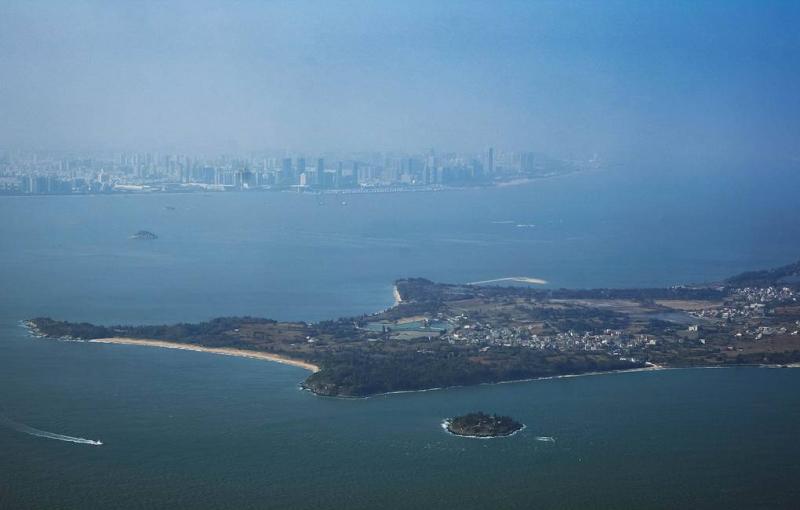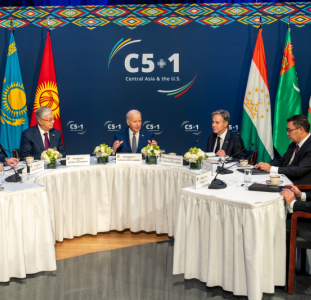
© An Rong Xu/Getty Images/TASS
Taiwan has put its air defense systems on alert in response to the approaching Chinese forces — 28 combat aircraft, including the Su-30s, and four warships of the People's Liberation Army of China (PLA), the Taiwanese Defense Ministry said in a daily statement. According to it, Taiwan sent an air and sea patrol to monitor the situation, and also deployed ground-based missile systems. The situation became tense when an American delegation with several congressmen visited the island on March 15-16.
Some experts immediately balanced the Taiwan issue against the US drone incident in the Black Sea. It is hard to predict the parties’ reaction if something like this happens in the Taiwan Strait. Taipei fears that Beijing may execute or somehow rehearse an act of sabotage aimed to cut off Taiwan's communications with the United States and leave the island offline.
The recent session of the National People's Congress (NPC), which ended on March 13 in Beijing, saw Chinese President Xi Jinping make it clear he would prefer a peaceful Taiwan reunification with the mainland. "We must… actively promote peaceful development of cross-strait relations, firmly oppose interference of external forces and Taiwan’s separatist activities, and resolutely advance the process of national reunification," the Chinese leader said. He also pointed to the need of defending the One China principle and adhere to the sides’ agreements of 1992. However, Beijing is empowered to use force if Taiwanese politicians, encouraged and backed by Washington, opt for separatism, Xi Jinping noted.
China's strength and determination to act along this very track were demonstrated in August last year, when then US House Speaker Nancy Pelosi arrived on the island. It all but entailed a direct military clash between China and the United States, with calls to shoot down Pelosi's plane over the Pacific. China, considering the island one of its provinces, strongly condemned the visit, deeming it as a move in support of Taiwanese separatism. On the same occasion the PLA conducted large-scale exercises off the coast of Taiwan, which made the latter stretch its every nerve.
And now history has virtually repeated itself — a whole group of US congressmen has visited Taiwan, including five Republicans (Ken Calvert and Mike Garcia, Tom Cole, Dave Joyce, Steve Womack) and Democrat Ed Keyes. Beijing does not say anything about whether the current deployment of PLA planes and ships outside the Taiwanese has been a response to this provocative gesture, but one may well assume this amid China's increasingly harsh and decisive statements and actions towards the United States. At least, in speeches by President Xi Jinping and the country's new foreign Minister Qin Gang at the recent National People's Congress many analysts saw signs of Beijing’s enforced confrontation course with Washington because of Joe Biden administration's Taiwan policy.
Notably, the current aggravation around Taiwan coincided with the remarkable incident with the American MQ-9 Reaper drone over the Black Sea, which reminded Beijing and Washington of something from their own recent history. This refers to 2001, when a US ER-3E reconnaissance aircraft was intercepted by two Chinese J-8 fighters some 110 km away from the Chinese island of Hainan. One of them crashed into the American plane, killing the Chinese pilot and forcing the 24 people onboard the reconnaissance aircraft to make an emergency landing on Hainan. They were arrested and interrogated until released and allowed back to the United States. Back then, the incident was over with no major consequences.
One cannot predict the course of events if a similar situation takes place today. 20 years ago, US-Chinese relations were nearly positive. American businessmen boldly invested huge money in China's growing economy, and the Chinese, in turn, ran successful businesses in the United States. But now the atmosphere has changed. Disputes over Taiwan, the South China Sea and US sanctions on the supply of microchips and other high-tech equipment to China have stepped up tensions between Beijing and Washington.
As things stand now, the Taiwanese authorities have considered various scenarios with an eye on the Ukrainian crisis, concluding that a possible Chinese attack would apparently target their Internet networks. The Defense Ministry of Taiwan makes no secret that the island is connected to the rest of the world by 14 underwater cables. An attack from China or even a cyber-attack would destroy those because of their weak protection, as an anonymous government official admitted, Reuters reported the other day — the Taiwanese cannot even repair the cables single-handedly. When preparing for an attack, Beijing would probably blow them up in the first instance, creating panic, paralyzing business and helping China impose its own narrative on those dwelling in the island. The Taiwanese authorities may be painting the devil blacker than he is, but this kind of scenario cannot be ruled out given the present-day situation.
Some experts believe Taiwan could get information from satellites. But they provide only 0.02% of information volumes arriving via the underwater networks. It would seem that the Taiwanese authorities could follow Kiev’s path and use the one owned by American billionaire Elon Musk. However, there's a hitch here: Musk sells his electric cars to China and has a factory based there to produce them. This is why official Taipei hardly counts on his loyalty.
Apparently, preparations have begun on the island for a confrontation with mainland China. As stipulated by the 2023 military budget, it will focus on stockpiling weapons and equipment for a "total blockade" by Beijing, Reuters reports with reference to the Taiwanese Ministry of Defense. In particular, this year's budget embraces funding of US-made weapons, including F-16 fighter jets, Stinger anti-aircraft missiles and HIMARS MLRS. And last year the Defense Ministry started reviewing its strategic fuel reserves and means to repair military equipment.
Given the Chinese leadership’s resolve, Beijing will definitely pay any price for defending its sovereignty and territorial integrity, even in the face of a confrontation with the United States over Taiwan. And in this regard, Washington should carefully listen to what Beijing says about the relevant circumstances.









